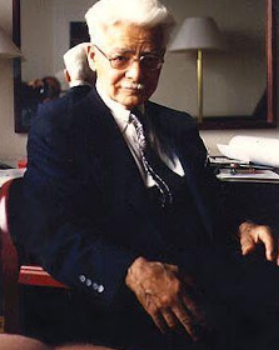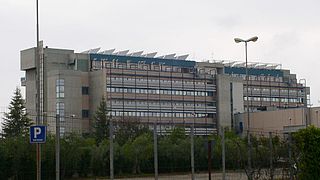Biography
Chemical technical specialist and medical doctor, he began his career as an assistant at the Pharmacology Institute [2] of the University of Milan where he remained until 1962 as a senior lecturer in pharmacology and chemotherapy. [3]
In 1963 he founded the Mario Negri Institute for Pharmacological Research of which he became the first director. [3] Over the years, the institute developed to reach staffing of approximately 850 researchers over four different locations in Milan, Bergamo, Ranica and Santa Maria Imbaro. [4]
From 1965 to 1968 he chaired the European Organisation for Research and Treatment of Cancer (EORTC); he is a component of the "Group 2003", [5] a group of Italian researchers held in high esteem in the global pharmaceutical environment. [6]
Garattini is the author of hundreds of publications in international journals and author of several treatises on pharmacology. [3]
During his career he was a member of several national and international organizations, [7] among which are the Committee of Biology and Medicine of the National Research Council (CNR), the Italian National Health Council and the Council of Ministers of the Presidency Commission for research policy in Italy, as well as Member of the Single Commission of the drug (CUF) of Italian Ministry of Health.
Other positions he held include: [8]
- Consultant of World Health Organization (WHO)
- Member of the Board of the Italian Istituto Superiore di Sanità
- Member of the Committee for Proprietary Medicinal Products(CPMP) of the European Agency for the Evaluation of Medicinal Products European Medicines Agency, (EMEA).
- Member of the Executive Committee for the Research Policy (CEPR) of the Italian Ministry of University and Scientific Research and Technology
- Member of Scientific Committee of the Italian League for the Fight Against Cancer
- Vice President of the Italian Board of Health
- President of the Chemotherapy Cancer Committee of the Union for International Cancer Control
- President of the European Organisation of research on cancer (EORTC)
- President of the European Society of Biochemical Pharmacology (ESBP)
- President of the Steering Advisory Group Current Controlled Trials
- President of the Commission for Research and Development of the Italian drug Agency (AIFA)
- Director of European Research Center for Drug Discovery and Development (NatSynDrugs). [9]
He is a fellow of the New York Academy of Sciences, of the American Association for the Advancement of Science and emeritus fellow of the Royal College of Physicians [10] }.
During his long career he received numerous national and international honours, including: the Legion of Honour of the French Republic for scientific merits, Grand Official of Italian Republic and several honorary degrees from several European universities. He received the America Award of the Italy-USA Foundation in 2018.

Daniel Bovet was a Swiss-born Italian pharmacologist who won the 1957 Nobel Prize in Physiology or Medicine for his discovery of drugs that block the actions of specific neurotransmitters. He is best known for his discovery in 1937 of antihistamines, which block the neurotransmitter histamine and are used in allergy medication. His other research included work on chemotherapy, sulfa drugs, the sympathetic nervous system, the pharmacology of curare, and other neuropharmacological interests.

Luigi Di Bella was an Italian medical doctor and physiology professor. In the late 1980s, he created a purported treatment known as "Di Bella therapy" for cancer that precipitated an international controversy.

Virgil Craig Jordan,, was an American and British scientist specializing in drugs for breast cancer treatment and prevention. He was Professor of Breast Medical Oncology, and Professor of Molecular and Cellular Oncology at the University of Texas MD Anderson Cancer Center, Houston, Texas. Previously, he was Scientific Director and Vice Chairman of Oncology at the Lombardi Comprehensive Cancer Center of Georgetown University. Jordan was the first to discover the breast cancer prevention properties of tamoxifen and the scientific principles for adjuvant therapy with antihormones. His later work branched out into the prevention of multiple diseases in women with the discovery of the drug group, selective estrogen receptor modulator (SERMs). He later worked on developing a new Hormone Replacement Therapy (HRT) for post-menopausal women that prevents breast cancer and does not increase the risk of breast cancer.

John Gordon McVie was an international authority on the treatment and research of cancer. He wrote over 350 peer-reviewed articles, editorials and books. McVie was born in Glasgow, Scotland and died of non-Hodgkin lymphona and COVID-19 in Bristol, England.
Enrico Alleva is an Italian ethologist. He has been president of the Società Italiana di Etologia since 2008.

Francesco Bellini, is an Italian-born research scientist, administrator, and Quebecer businessman.

The Mario Negri Institute for Pharmacological Research is a nonprofit research institute dedicated to clinical and biomedical research. It was made possible by a special bequest of Milan philanthropist Mario Negri. It was founded in 1961 although it started working in Milan from 1st Feb 1963. There are branches of the institute in Bergamo, Ranica (BG), and at Santa Maria Imbaro, near Chieti.

Georges Mathé was a French oncologist and immunologist. In November 1958, he performed the first successful allogeneic bone marrow transplant ever performed on unrelated human beings.

Giacomo Devoto was an Italian historical linguist and one of the greatest exponents of the twentieth century of the discipline. He was born in Genoa and died in Florence.

Simonetta Di Pippo is an Italian astrophysicist and former Director of the United Nations Office for Outer Space Affairs (UNOOSA). She holds a Master’s Degree in Astrophysics and Space Physics from University "La Sapienza", and an Honoris Causa Degree in Environmental Studies, and an Honoris Causa Degree of Doctor in International Affairs. In 2008, the International Astronomical Union (IAU) named asteroid 21887 "dipippo" in honour of her contribution to space activities and in 2006, she was knighted by the President of the Italian Republic Carlo Azeglio Ciampi.

Claudio Carosino, MD was an Italian general practitioner and family physician, tutor and mentor engaged in rural medicine. Carosino was shot and killed by a patient while performing a house visit in the rural village of Roncole Verdi in Italy.
Alessandro Liberati was an Italian healthcare researcher and clinical epidemiologist, and founder of the Italian Cochrane Centre.

Paul Workman is a British scientist noted for his work on the discovery and development of pharmaceutical agents in the field of oncology. He is President and CEO of The Institute of Cancer Research In London.

Gian Luigi Gessa is a professor of Neuropsychopharmacology at the University of Cagliari, where he has led for a long time the Department of Neurosciences. He is the leader of the Italian group that studies drug addiction. He also directed the research groups of the National Research Council.
Cora Sternberg is an American medical oncologist.
Kurt Hellmann was a Bavarian clinical pharmacologist best known for his discovery of the biologic activity of two important drugs: Razoxane and Dexrazoxane.

Alberto Mantovani is an Italian physician and immunologist. He is Scientific Director of Istituto Clinico Humanitas, President and Founder of the Fondazione Humanitas per la Ricerca, and Professor of Pathology at the State University of Milan. He is known for his works in the roles of the immune system in the development of cancer. His research on tumor-associated macrophages established inflammation as one of the causes of cancer. He was the first to identify monocyte chemotactic protein - 1 / CCL2 in 1983, and PTX3 in 1997. His works revealed the existence of decoy receptors in cell-signalling. He has been the most cited scientist in Italy, and one of the ten most cited immunologists worldwide.
The Metastasis Research Society (MRS) is an international professional society dedicated to metastasis research and treatment. Headquartered in Tampa, Florida, the MRS was formed in 1974 as the E.O.R.T.C. Metastasis Club by Bavarian clinical pharmacologist Kurt Hellmann and Director of the Mario Negri Institute for Pharmacological Research Silvio Garattini. It took its current name in the mid-1980s, with its first international meeting as a formal society in 1984 in London.

Luciano Onder is an Italian journalist and science broadcaster, best known for presenting the shows Medicina 33 and TG5 Salute.
John A. Hickman is a British-French cancer pharmacologist.
This page is based on this
Wikipedia article Text is available under the
CC BY-SA 4.0 license; additional terms may apply.
Images, videos and audio are available under their respective licenses.














